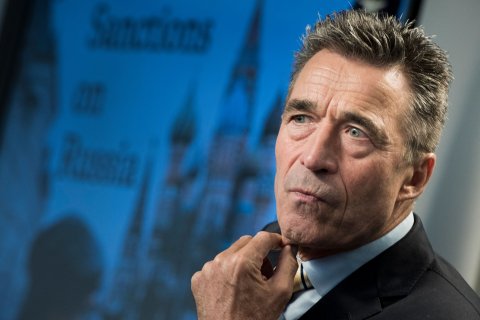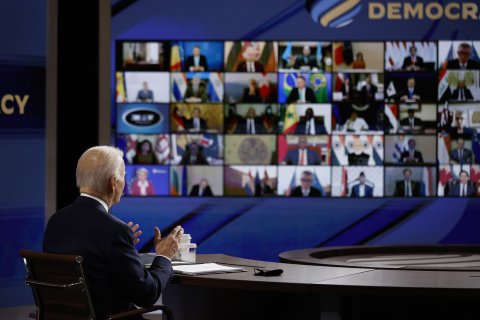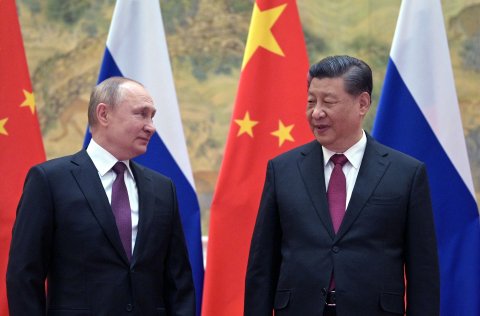Just over two months into Europe's biggest war in decades, Newsweek sat down with former NATO Secretary-General Anders Fogh Rasmussen to discuss a wide range of issues, as the alliance he led during Russia's initial incursion into Ukraine eight years ago takes unprecedented measures against Moscow following its full-scale invasion. Rasmussen believes that democracies across the globe must form a coalition of their own to beat back a growing rival bloc dominated by autocratic powers.
Prior to heading NATO from August 2009 to 2014, Rasmussen served as prime minister of his home country of Denmark. Today, he leads the Alliance of Democracies Foundation, an organization he founded in 2017 with the goal of strengthening the democratic nature of nations as well as the bonds between them.
Rasmussen feels this goal is more important than ever at a time when Russia is waging open war against a country seeking to join NATO, and as a rising China presents a new challenge to Western aspirations in the Asia-Pacific region and beyond. And with tensions rising between two emerging geopolitical blocs, he also asserts that the economic ties that have long served as a motivation for world peace may soon be strained to the point of total collapse.
The former NATO chief argues that the division of the international community into a democratic camp and an autocratic camp would not only dominate the future of geopolitics for years to come, but would also play a leading role in defining the world order.
This transcript has been lightly edited for clarity.
Newsweek: In the face of Russia's war in Ukraine, we're seeing substantial unity among Western countries, especially the United States, NATO and the European Union, regarding the use of sanctions and other measures. Will this unity last, especially given the different economic effects of these steps on individual countries?
Rasmussen: Yes, indeed, this unity will be challenged. And there will be a lot of attempts to split the U.S. and countries within Europe. But my conclusion is that it will last. We will resist all attempts to divide.
Let me take energy as an example. By cutting exports to Poland and Bulgaria, [Russian President Vladimir] Putin has demonstrated to the whole of Europe that it's his intention to use energy as a weapon. So his own acts are now provoking this strengthening of unity and solidarity within Europe. I think under [continued] pressure from Russian aggression, this unity will last.

Newsweek: I'm sure that's the hope of many people who are hoping to promote and keep this pressure on right now, one of them being President Joe Biden, who is suffering from poor approval ratings at home when it comes to perceptions of his leadership and his administration. How would you evaluate Biden's performance thus far on foreign policy?
Rasmussen: There is often a discrepancy between the view among foreigners and the view of the domestic audience when it comes to political leadership. Seen from a European perspective, Biden has done quite well. It's not least thanks to his leadership that we have created and maintained an unprecedented unity and solidarity across the Atlantic. I don't have any complaints about his performance in that regard.
Furthermore, he has spoken his mind a couple of times. The last time was a speech in Poland where he actually went beyond his manuscript and spoke deeply from his heart. In Europe, we consider that refreshing. People sense that, in addition to being a professional leader, he's also a human being, who just wanted to speak his mind, as he did previously on Taiwan, when he indicated that he would be willing to defend Taiwan if China were to attack. The State Department and diplomats were very quick and eager to backtrack. But the president spoke his mind and in Europe, we find it quite refreshing.
Newsweek: Is Europe worried about how the domestic situation politically in the U.S., with the upcoming midterm elections and the future presidential election in 2024, could affect the transatlantic alliance?
Rasmussen: Absolutely. We are following developments very, very closely. Because, if the midterms, in reality, or could be interpreted as a strengthening of isolationism in the U.S. and a lack of will and capability to help in Ukraine and other hotspots in the world, wherever help is needed, then it will be seen as a weakening of the alliance that de facto now has been created among the world's democracies.
In other words, it may well be that [former President Donald] Trump has gone, but if Trumpism is still there, then we have a problem.
We need determined American global leadership. If it's not there, if America retreats, it will leave behind a vacuum that will be filled by the bad guys. We appreciate very much the statement of Biden that America is back. And in particular, we appreciate that it has also been demonstrated in concrete terms with Ukraine.
I hope, irrespective of the outcome of the midterms, this line will be maintained in Congress in a bipartisan manner. [What] gives hope, [is that] so far, the Ukraine and Russia policies and also China policies are based on broad bipartisan support in Congress.
Newsweek: The U.S. isn't the only place where right-wing forces are looking to take control of the government, as we saw recently in the French presidential election. Is there a concern that these elements will continue to try to take power and perhaps even take advantage of the conflict in Ukraine to do so?
Rasmussen: Yeah, but it's a theoretical question because Putin's actions are so horrendous, that, actually, the far right has been weakened all over Europe.
The French case is a bit particular. Not only [Marine] Le Pen on the far right, but also [Jean-Luc] Mélenchon on the far left, was strengthened. It has nothing to do with Putin. It's because, in France, many people, in particular in the rural districts, feel left behind and they may vote right-wing or left-wing, they want to drain the swamp, so to speak. It's a rebellion against the elite in Paris. In that respect it is not only a far-right movement, it's also seen on the far left. I think these developments have actually strengthened the EU.
In that respect, Brexit has strengthened the unity within the European Union. You don't observe any serious discussion in any EU country on exit from the European Union because no one wants a repeat of what they witnessed in Westminster in London. So Brexit, Putin's behavior, etc. have actually stopped all those discussions and in fact strengthened the European Union.

Newsweek: Another critical region for deciding the future of the world order is the Asia-Pacific. There we're seeing tensions when it comes to China and Taiwan, tensions that U.S. allies Japan and South Korea have with China and also now with Russia, because Japan shares a border with Russia. These countries are getting more vocal about their opposition to Russia and China. How is the Ukraine conflict impacting this region when it comes to the efforts of Western powers to promote democracy?
Rasmussen: The Ukraine conflict will impact Asia-Pacific geopolitics in many respects.
Let's start with China. China is not comfortable with the Russian attack on Ukraine. China has never formally recognized the illegal annexation of Crimea into the Russian Federation. And two weeks before the Russian attack on Ukraine, the Chinese foreign minister declared at the Munich Security Conference that it's a basic principle in Chinese foreign policy to respect the sovereignty and territorial integrity of all countries, and stressed, "also for Ukraine." So they're trying to strike the right balance.
In the China-Taiwan relationship, this will also have an impact because [Chinese President] Xi Jinping has now seen how the West can and will react if we are pressed or attacked by autocrats. He has seen an unprecedented Western unity also when it comes to military assistance. So I think, paradoxically, Russia's attack against Ukraine has postponed the timing of a possible Chinese attack on Taiwan, apart from the fact that geographically, militarily and technically, it's a very complicated operation. Geopolitically, the major impact in the short term is it has postponed the timing of a Chinese attack against Taiwan.
India is another interesting player, also trying to strike the right balance, because India views all geopolitics through the prism of their problem with China. This is a reason why India has, for many years, cultivated a strong relationship with Russia when it comes to the delivery of weapons from Russia. But at the same time, India wants to strengthen the relation- ship with the U.S., when it comes to security. The most concrete example is the Quad, the Indo-Pacific security cooperation between the U.S., Australia, Japan and India, which India wants to strengthen.
It's a challenge for India to strike the right balance. How could we change their calculation? I consider India as belonging to the democratic camp in the world, so I think we should provide India with some chances and possibilities to replace weapon deliveries from Russia with weapons from the U.S. and our kind, so to speak. So we will gradually drag India into our camp.
In the short term, you will see a division in the world between two camps: the democratic camp and the autocratic camp. The autocratic camp expressed itself at the Xi Jinping-Putin document that was issued at beginning of the Winter Olympics in Beijing. I call it the autocrats' manifesto, in which there was a pledge to change the world order with the aim to diminish the role of the U.S. and its allies. At the same time, Biden has tried to create, so to speak, an alliance of democracies representing 60 percent of the global economy.
In the coming years, you will see a division in the world between these two camps, and less economic interaction between [them]. Many companies are already now reviewing their supply chains. So we have a clear interest in ensuring that India as the world's most populous democracy, belongs whole-heartedly to the democratic camp.
Newsweek: There are a lot of countries that fall somewhere in the middle of that divide, countries with which the U.S. and the West do extensive business. What is the strategy to engage with these countries, especially those with monarchs or long-standing strongmen in power? Is there any way to make them a democracy or do you just have to live with them and make sure they don't strengthen ties to the autocratic camp?
Rasmussen: It's a key question, because, obviously, this is not black and white. I tried to describe it as a struggle between two camps. And, you're right, in between, you have countries with a dubious democratic record. I think we should deal with them not as an integrated part of our alliance of democracies, but as countries with whom we could deal.
For instance, in the Middle East, you have the Gulf states that could provide us with energy supply in a critical situation where we will cut off economic ties completely with Russia, not to import any oil and gas from Russia. Then in the short term at least, we will need supplementary supplies from Qatar, from the UAE. And though they are not democracies, we will have to cooperate then. I would consider them, frankly, autocracies. But in [that] group, you have some that tend to support the autocrats and others that tend to support the democratic camp.

Newsweek: With the emergence of these two camps in the world and rising tensions and perhaps a loss of economic integration between them, should we expect more direct confrontation between nations or more of a slower, Cold War-style effort to drain each other's influence? What does this future look like when it comes to the dynamics between these two camps? Is war inevitable? Is diplomacy still possible?
Rasmussen: Both possibilities exist. We should always give diplomacy a chance. And, for the time being, I would exclude an outright war. My caveat is that we have seen the ruthlessness of President Putin, so we cannot exclude anything, both options are on the table.
My theory, based on historical experience, is that the best instrument to counter autocrats is a firm stance, unity, determination. In the short term, I think this division of the world into two camps, an autocratic and democratic camp, is inevitable. But we represent the strongest economic force, the strongest military force and, in my opinion, also the best idea that appeals to individuals all over the globe because I think the desire for individual liberty, the right to determine your personal destination and life yourself, that's fundamental, that's global. It's in all people. So I think, like during the Cold War, we have the best alternative, the best offer to people.
If the democratic world can stand together, can maintain unity, then we will also prevail, and then, hopefully, convince the autocrats that constructive cooperation is better than destructive confrontation. This alliance of democracies should also include trade agreements, stronger economic relations among the world's democracies, also military cooperation. Many companies are now reviewing their supply chains, so I think China will pay a price for all this. Companies will withdraw from China. They will locate production in neighboring countries, more democratic countries in Asia, or even near to the U.S. and Mexico or in Eastern Europe for European countries.
So I think you will see less economic interaction in the short term between these two camps, but it's an inevitable phase. We have to go through this stage in our history before the autocrats will realize that it's better to engage with us. And now in Russia, for instance, you have seen threats against companies that wanted to withdraw, that Russia would nationalize their assets and, obviously, companies will now think twice before they are investing in Russia.
So I think all companies in the future will have to choose between the democratic camp and the autocratic camp. Business is not only business, it's also politics.
About the writer
Based in his hometown of Staten Island, New York City, Tom O'Connor is an award-winning Senior Writer of Foreign Policy ... Read more














